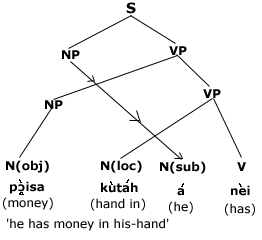|
|
When
there are more than one NP representing the object and
other cases in the VP under the predicate slot, the
objective case preceedes all other and as usual, subject
NP gets in between the constituents of VP. The following
examples could be seen : |
 |
bù
kùtín
kán
fà:k
(food)
(by hand) (we)
(eat)
‘we eat rice by hand’ |
Thus,
it would appear that the order of occurrence of various
NPs and VPs in a simple kernel sentence in Hmar is very
much flexible. Transitive agent, if there is any, fronts
the sentence; if the agent is a 3p noun a 3p pronoun
/a/ occurs with the VP before the last constituent.
An NP with instrumental case function also could occur
sentence initially. A VP with verbal function generally
does not occur initially; in some imperative constructions,
however, VP could occur initially
also as the subject pronoun is always silent or understood.
|
| 4.2.2 |
Kernal
Sentences containing Adverbs |
|
It
is possible to expand the kernel sentences described
above by adding appropriate adverbs. The preferred position
of an adverb of time in a sentence is the front of the
sentence. Two of the above sentences when expanded by
adding adverbs for ‘tomorrow’ and ‘yesterday’ would
appear as under: |
/zí áh
sìkúlàh
fè: áh
sìkúlàh
fè: ká tìh/
ká tìh/
(tomorrow) (school)(at) (go)
(I) (+future)
‘I will go to school tomorrow’
/zàní
bù kà
fá:k tàh/
(yesterday) (food) (I)
(eat) (+ past)
‘I ate rice yesterday’ |
|
It
may be noted that if ‘past tense’ is signaled by an
appropriate adverb the past tense marking auxiliary
could be optionally deleted.
An
adverb of manner prefers to occur sentence initially
but could move elsewhere as well, subject to the condition
that adverbial marker is optionally deleted. In imperative
sentences the subject NPs get deleted. Therefore, the
imperative sentences are VPs alone and not tree structure
is needed. |
/ìnhm tákìn
fé r tákìn
fé r h/ h/
(quickly)
(go) (+ imperative)
‘go quickly’
or,
/fè ìnhm r
r h/ h/
‘go quickly’
/dámté:n hú r
r h/ h/
(slowly) (come) ( + imperative)
‘come slowly’ |
|